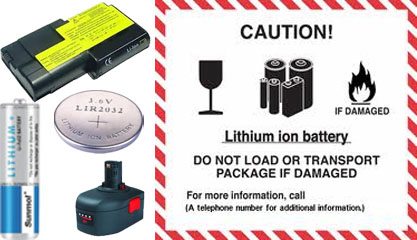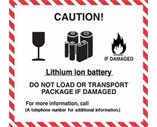 A jury at Southwark Crown Court have decided that no one, not even Amazon, can ship dangerous goods such as lithium ion batteries by air. It’s a reminder to all retailers of dangerous goods that you can’t simply pop these items into the post. Royal Mail have published a PDF detailing restrictions on dangerous goods and they’re much the same for other couriers as well.
A jury at Southwark Crown Court have decided that no one, not even Amazon, can ship dangerous goods such as lithium ion batteries by air. It’s a reminder to all retailers of dangerous goods that you can’t simply pop these items into the post. Royal Mail have published a PDF detailing restrictions on dangerous goods and they’re much the same for other couriers as well.
Amazon UK Services Ltd were taken to court by the Civil Aviation Authority (CAA) for allegedly sending lithium-ion batteries, aerosols and car screen wash on planes back in 2013 – 2015.
Amazon’s defence was that the rules shouldn’t apply to them and at the start of the trial they pleaded ‘No Guilty’, saying “The issue is there is no dispute on the prosecution statement of facts, but there is statutory defence of reasonable care”. Obviously that didn’t go down too well with a good old British jury who decided that rules are rules and the CAA rules on what potentially dangerous goods can and cannot be transported safely must be stuck to.
Apparently fines under the Air Navigation (Dangerous Goods) Regulations 2002 could be unlimited. Amazon will be sentenced on Friday.
Amazon issued a statement saying “The safety of the public, our customers, employees and partners is an absolute priority. We ship millions of products every week and are confident in the sophisticated technologies and processes we have developed to detect potential shipping hazards. We are constantly working to further improve and will continue to work with the CAA in this area“.











2 Responses
This is ridiculous, ZILLIONS of Li-ion batteries are made each year, Every E-Cig smoker uses them for example, almost every electronic battery powered device including mobile phones use Li-Ion batteries.
The more ‘dangerous’ type of battery if mistreated is Li-po (Lithium Polymer) used mostly by Radio Control enthusiasts, and yes, ALL these ‘toy’ drones available big and small use Li-po batteries !
cant believe amazon pressed forward with that as a defence.
their “reasonable care” would be a tick-box asking if the goods are prohibited, if you dont tick it, amazon believe they’re covered.
whereas actual “reasonable care” may involve, at a minimum, identifying products which contain prohibited batteries, and not carrying them where they are prohibited.
like, a 12-year-old walks into an off-sales.
the sales assistant asks if they are over 18.
the 12-year-old says yes, despite clearly being under 18.
sales assistant sells him vodka and claims they took “reasonable care”.
– obviously they didnt take reasonable care. they did the absolute minimum, which is insufficient.
whether you agree with the ban or not, it’s in place.
these were passenger-carrying aeroplanes with members of the public on board, who amazon have put in danger.
what if there was a shipment of Samsung Note-7’s in the cargo hold, along with you and your kids, going on your holidays?